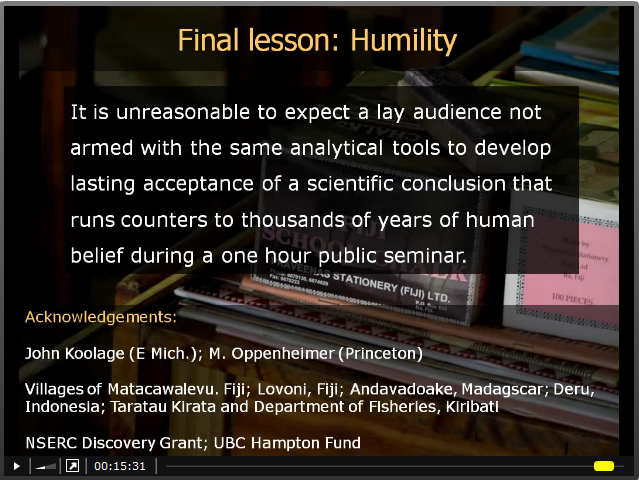Basically, journalists stopped asking the awkward questions of scientists that journalists in other fields know makes their careers (see: Dan Rather and Richard Nixon). Result: While the science audience is up and science knowledge has tripled since 1988, jobs in science journalism are down. Few people read them.
But bloggers were really no better then - unless it was about Republican science positions, then they had plenty of skepticism and fact-digging, but they didn't seem to care as much about real science outreach as they did garnering votes for Democrats. Being frank, it's hard for a conservative who wants answers to read bloggers and be berated constantly because they don't think giving more money to the government is the solution to everything, and then believe the science answers will be any better thought out. Anyone who has contended women don't go into science fields because there already aren't a lot of women can surely understand why Republicans couldn't even read a lot of science blogging by academics, much less have a career in academia.
In the fifth year after Al Gore filmed the most successful Powerpoint slideshow presentation in history - and global warming acceptance reached its fevered pitch - things haven't changed very much in climate policy. And that frustrates some people. They believe that if the data is right there hearts and minds should be changed about taking action; the same way conservatives believe that giving more money to the government doesn't actually create a better world and wonder why everyone else doesn't accept it.
Mindset and prioritization is really the crux of it. When you discuss the science of the atmosphere, just like when you discuss economic policy, people are not always speaking a common language. When you change the language, you get a different answer.
60.2% of Republicans accepted climate change as science fact but only 44% of Republicans accepted global warming in a recent survey, but they were the exact same thing to progressives - 86% of them accepted it no matter which term is used. But it isn't the same thing at all, as all have found out. When the Union of Concerned Scientists (UCS) held a recent press conference to talk about snowstorms and climate change, they were shucking off the constraints of global warming that wasn't global and embracing a more nuanced model of climate instability. That means 56% of Republicans turned out to be right and 86% of Democrats were wrong throughout the entire decade that global warming was big news. Properly framed - I know, I know, only Democrats are allowed to frame results - it means Republicans were actually smarter about science all this time.
And they're gloating about it.
James Taylor in Forbes showed no end to delight in the recent UCS conference because it gave him a chance to note that the IPCC stating global warming would accelerate and "milder winter temperatures will decrease heavy snowstorms" along with “the science is settled” and “the debate is over” don't look all that scientific when instead snowstorms are heavier and Jeff Masters, director of meteorology at the Weather Underground, had to quite patiently concede, "Have we learned a great deal since the IPCC 2001 report? I would say yes, we have. Climate science, like any other field, is a constantly evolving field and we are always learning."
So why do Republicans buy into climate change but not global warming? Language and presentation. The incredibly flawed Kyoto protocol wanted American voters to accept that American cars were causing global warming and should be mitigated yet Chinese, Mexican and Indian cars were okay. That was good science? No, it was an economic/political agenda by competitors to America and it caused a rupture in acceptance that got attached to global warming as a term, because it picked just one greenhouse gas and tried to lay fault at the feet of one country. 'Climate change', on the other hand, feels egalitatian and exculpatory. It's also more exact; change can mean temperatures go up or down and specific weather events are unimportant, which is why Al Gore holding an urgent global warming seminar during a blizzard looked silly but UCS using blizzards as a teaching moment on climate instability is not, regardless of whether or not a few pundits delight in sticking it to the climate experts forced to endure press conferences and take some lumps.
People being people, there also may be some cultural revenge happening. Environmentalists have been keen on sending the message that 'Mother Nature is awesome and we are puny and insignificant' for decades though perhaps it has been ingrained in the collective unconscious longer than that. James Hrynyshyn at Scienceblogs.com discusses Simon Donner's recent American Meterological Society presentation:
His experience among Pacific Island cultures suggests that this notion -- that climate change is by definition the purview of forces greater than ourslves -- is near universal, predating the Judeo-Christian canon and deeply embedded just about everywhere we go.10,000 years or more of nature being too big for us to imagine and now we are supposed to believe my incandescent light bulb is ruining the place?
He suggests that any communications strategy designed to shift public opinion on global warming literacy "needs to include the full history and development of human thinking about climate."
Donner's message is simple and it's one that all science writers, and certainly the more militant science bloggers, should take home:

Climate science is suffering some bad PR at the moment but it should not be a crisis of confidence. The IPCC has vowed to rein in its Working Groups, climate scientists are not going to smugly declare "the science is settled" on something as complex as the climate and there should be fewer public relations blitzes designed to frame policy debates instead of getting people to accept science.
If even 60% of Republicans accept climate change, and they do, the science is going to win.




Comments